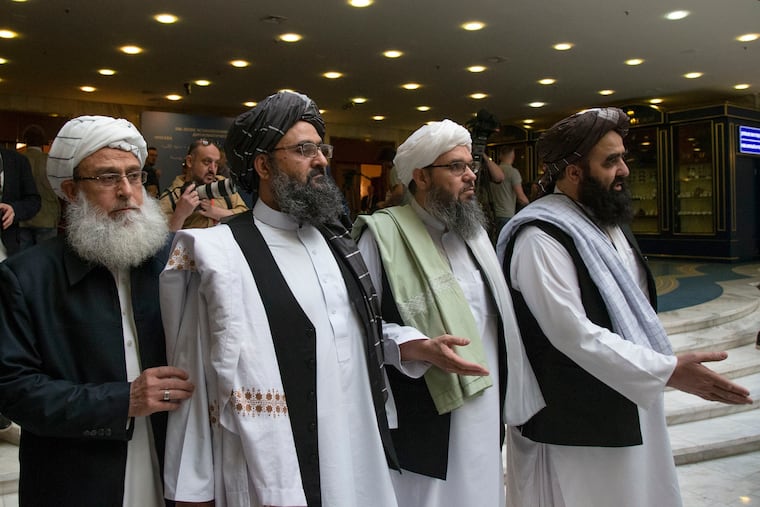’Peace deal’ with Taliban will fail without continued U.S. troops in Afghanistan | Trudy Rubin
If Trump pulls troops out too fast, Afghan "peace talks" will bring civil war and Taliban takeover, along with new terrorist threats.

In 1999, I traveled to Afghanistan when the Taliban controlled the country.
Swathed in shawls, exiting my taxi only when sneaking into buildings, I visited secret girls’ schools in private apartments, where 10-year-olds braved beatings to learn how to read. I interviewed former female university professors who, under the Taliban, could rarely leave their homes, and then only when shrouded beneath a tentlike burka.
And I interviewed then-Taliban deputy health minister Mohammed Abas Stanekzai, who is now one of the negotiators of a “peace deal” with the United States that will probably be signed on Feb. 29, according to Secretary of State Mike Pompeo.
So, it is useful to recall what Stanekzai said at the time. He firmly defended excluding girls from schools and women from any Kabul hospital except the sole facility where the Taliban permitted female doctors to work. Moreover, women could seek treatment there only if accompanied by a male relative, even though many war widows had none.
» READ MORE: Will United States sell out Afghan women to Taliban? I Trudy Rubin
I can’t help recalling Stanekzai’s remarks as this “peace process” plays out. Much has changed in Afghanistan over the last 20 years, but there’s little sign the Taliban has changed its core positions — on women or much else. So don’t be fooled by any upbeat administration rhetoric — U.S. talks with the Taliban are still in for a very bumpy ride.
The deal Pompeo cited depends on a precondition: The Taliban must hold to a seven-day significant reduction in violence nationwide, beginning this weekend. That is meant to test whether Taliban leaders can control their fighters.
If the truce holds, intra-Afghan talks will supposedly begin between the Taliban and the elected Afghan government, along with representatives of civil society groups. The process is meant to devise a new political arrangement that would include the Taliban. (As if this isn’t sufficiently daunting, the Afghan government is mired in a dispute over election results, which could delay the talks.)
If the United States is satisfied with progress over the next four months, it will start drawing down its 14,000 military personnel according to an agreed-upon timetable, beginning this year. Supposedly, a final withdrawal will depend on the outcome of the talks and on proof the Taliban will prevent any terrorist resurgence.
Yet it’s highly unlikely that the Taliban (or its fighters) will be willing to become one political party among many. Its leaders demand a restoration of their former Islamic Emirate, where religious law would replace the Afghan constitution with its guarantees of basic human rights, including for women. They want all U.S. troops out soon, which would mean the Afghan army would collapse.
“The Taliban is poised to take it all,” says Marvin Weinbaum, head of the Afghanistan-Pakistan program at the Middle East Institute in Washington. “They know the U.S. is desperate to get out.” And the Taliban hopes it can ride U.S. impatience to the victory it can’t win in the field.
Toward that end, the Taliban is already trying to airbrush its history. On Friday, the New York Times ran an op-ed by its deputy leader, Sirajuddin Haqqani, who is on the U.S. terrorist list, in which he claims “we were forced to defend ourselves” and “the killing must stop.” He portrays himself as speaking for all Afghans.
You’d never know from this puff piece that his Haqqani network helped Osama bin Laden escape -- and carried out horrendous suicide-bomber attacks on Afghan civilians in Kabul.
You’d never know that much of Afghanistan is fearful of a Taliban return – as I heard over and over when visiting Afghan villages during the 2000s – because they think the group and its fighters distort Islam. You’d never know that Afghan Hazaras – a Shiite ethnic group who make up 10% to 20% of the total population – are terrified, because the Pashtun Sunni Taliban slaughtered them under its rule.
And you’d never know that a new generation of educated Afghans, including female teachers, lawyers, judges, and journalists – who consider America an ally — don’t want to return to the days of burkas, male guardianship, and limited religious education. Under such a regime, their choices would be flight, jail, or worse.
No wonder, the New York Times correspondent in Kabul, Mujib Mashal, tweeted that the Haqqani op-ed “omits the most fundamental fact: that Siraj is no Taliban peace-maker as he paints himself, that he’s behind some of the most ruthless attacks of this war with many civilian lives lost.”
(I’d add that I find it shocking the Times published this piece without a background note on Haqqani, or a matching piece that challenges his pretensions.)
This U.S.-Taliban deal may present an opportunity, but only if the White House has the patience to hold out for a negotiated solution that precludes a Taliban takeover. And if Trump isn’t gulled by Taliban sweet talk and the urge to declare “victory” before November elections.
» READ MORE: Trump should be wary of Pakistani help in ending Afghan war I Trudy Rubin
Bringing all the troops home too soon will destroy any U.S. leverage and hand victory to the Taliban. In that case, this “peace” plan will deliver more tragedy to Afghans and more security threats to the USA.